ARIJ Emerges After IPJ–IMS Workshop
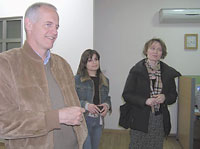
Anders Jerichow, Sahar Sababa and Pia Thordsen at an AmmanNet meeting.
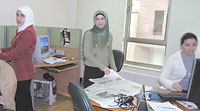
Eager journalists prepare content for AmmanNet webcasts
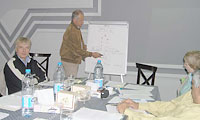
Lars Kabel, Anders Jerichow, Pernille Brix and Daoud Kuttab discuss makeup of ARIJ.
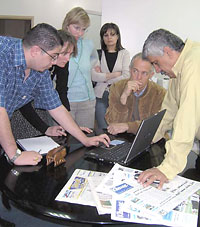
ARIJ founders listen as Raed Neshiewat demonstrates usability of ARIJ website.
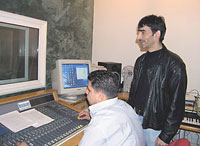
Emad Salsa (standing), AmmanNet musical director, supervises a webcastshow from control room.
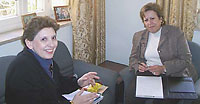
Abu-Fadil visits Mahasen Al Emam, director of the Arab Women’s Media Center in Amman.
Arab Reporters for Investigative Journalism’s Steering Committee met in Amman April 2–3, 2005 to give more substance and support to journalists who attended a workshop and began pursuing projects in Lebanon, Syria and Jordan.
LAU’s Institute for Professional Journalists had organized the workshop following meetings in Copenhagen, Beirut and Damascus to lay the groundwork for a more formal structure for ARIJ and eventual expansion of its mission in the Arab region.
AmmanNet, the Web-based radio station in Jordan, was charged with administering the test investigations. AmmanNet appointed TamamTech to design a website for the project and for journalists to create a culture around each investigation through background information, photo documentation and reporters’ notes.
Test investigations were conducted in Lebanon, Syria and Jordan and reviewed by the ARIJ Steering Committee during the Amman meeting. In Lebanon, the project focused on conditions inside the country’s main women’s prison. In Syria, the investigation was into the use of illegal growth hormones and Jordan’s project centered on water bottling and filtering.
Committee members reviewed ARIJ’s legal status with an attorney in a bid to register it as a non-profit company in Jordan, thereby enabling it to receive outside funds. Amman participants also checked out ARIJ’s new website.
The investigative journalism workshop in January 2005 was funded by Denmark’s International Media Support, with a grant from the Danish Foreign Ministry. It focused on the duties and responsibilities of investigative journalists, story ideas, research, designing projects, ethics and the use of modern technology.
Danish experts Pia Thorsden, of the Danish Association of Investigative Journalists FUJ, Prof. Lars Kabel of Denmark’s School of Journalism, and columnist/Middle East expert Anders Jerichow of the daily Politiken assisted in the workshop’s tutoring.
They were supported by IPJ director Magda Abu-Fadil, Dr. Mahmoud Tarabay of the Lebanese University and Lebanon’s LBCI TV senior correspondent Tania Mehanna who shared practical experience and exercises to illustrate examples of good and bad investigative assignments.
The ARIJ Steering Committee groups Daoud Kuttab (AmmanNet), Nabil Dajani (American University of Beirut), Ibrahim Hamidi (Al Hayat daily newspaper) and Abu-Fadil.

